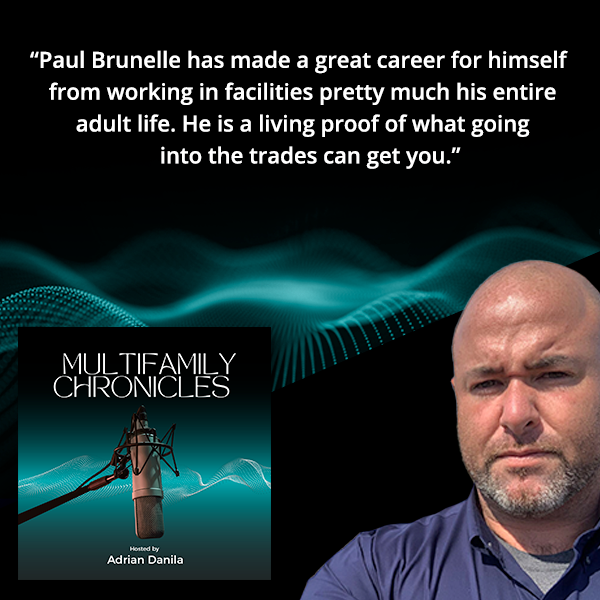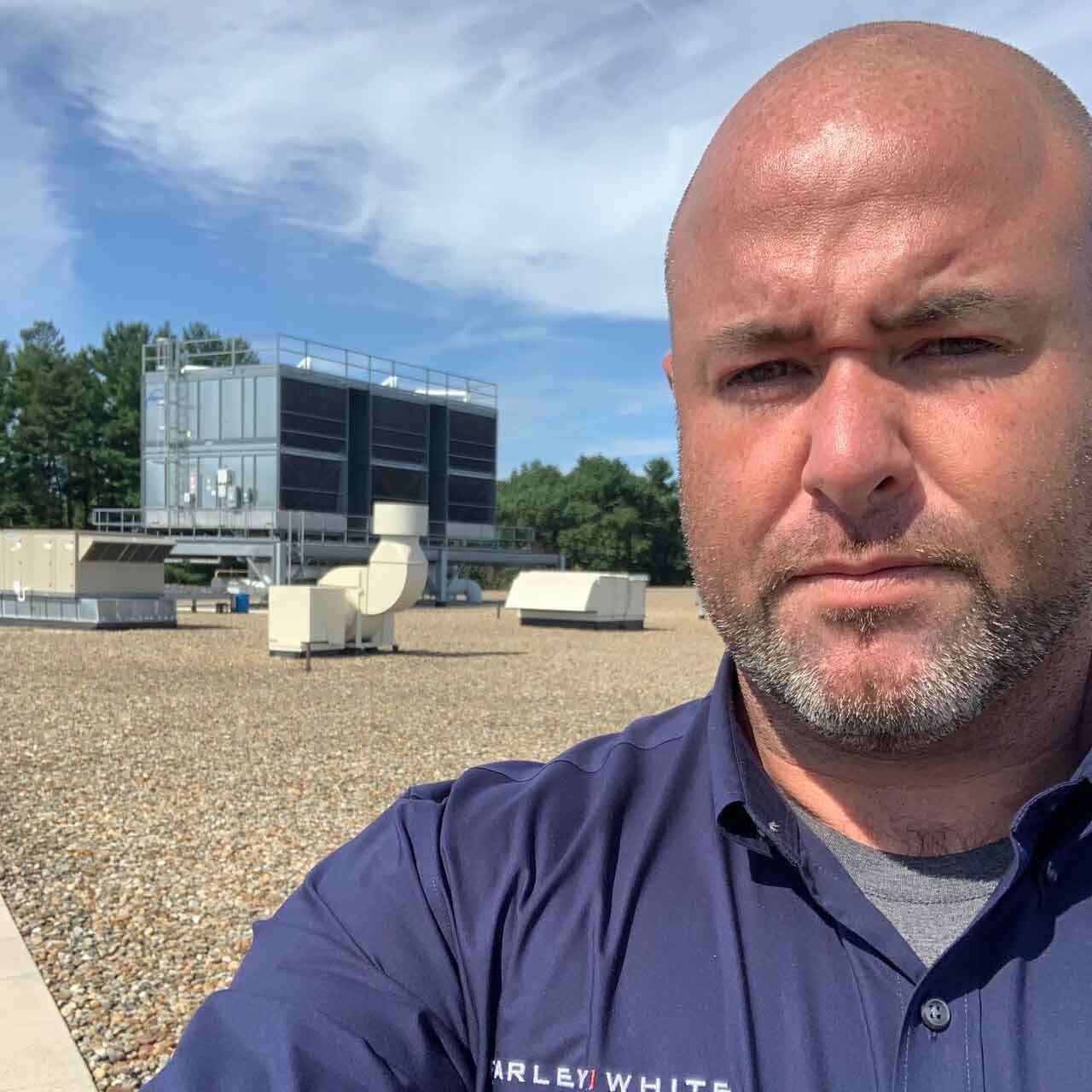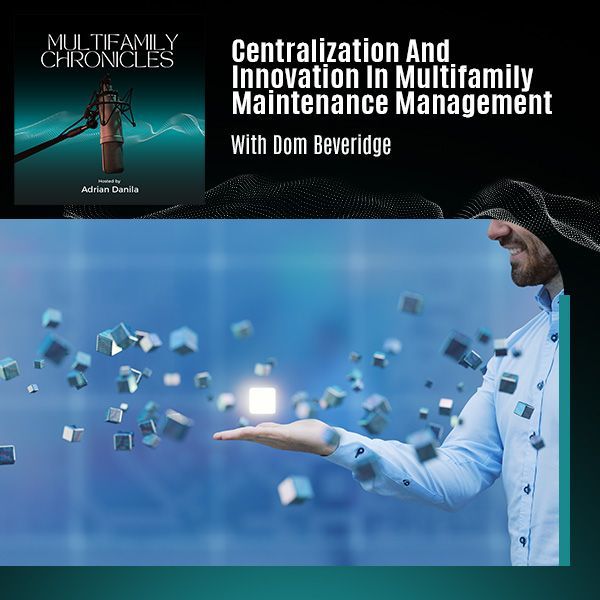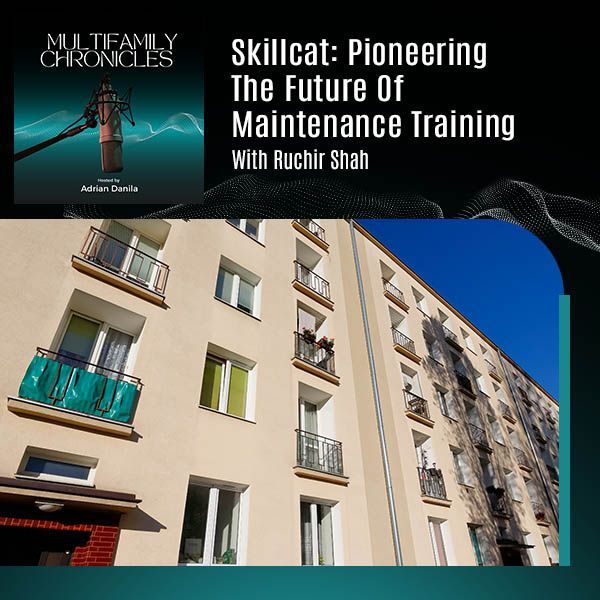Breaking The Mold: How To Find Success In The Trades With Paul Brunelle
Success isn't defined by the path you take, but by the hard work and dedication you put into it. Trades and professions offer a valuable alternative to college, with the opportunity to make a meaningful impact in the world and financial stability and growth. In this episode, Paul Brunelle, Chief Engineer at Fairleigh Whit Management, shares his inspiring journey of finding success in the trades. Paul challenges the common misconceptions around college and technical schools and offers great insight into the value of pursuing a career in trades or professions. He shares his own experience of starting in a technical high school and becoming a qualified tradesperson, earning $130,000 by the age of 23. While acknowledging the opportunities and privileges he had along the way, Paul provides valuable advice for those looking to follow a career in the trade, including growth opportunities and potential financial stability. He also discusses how some companies are offering to pay for qualified workers' education. If you're interested in pursuing a different path towards success, or simply looking for some inspiration, don't miss this insightful conversation with Paul.
---
Watch the episode here
Listen to the podcast here
Breaking The Mold: How To Find Success In The Trades With Paul Brunelle
My guest is Paul Brunelle. Welcome to the show, Paul.
Thank you very much. Glad to be here.
Paul, I do want to say that you are the Chief Engineer for Farley White Management. Let’s start by introducing you to the audience by telling us a little bit about what you’re doing in your current role.
I’m a Chief Engineer in a facilities position, like maintenance. I’m responsible for the entire physical property from the roof, facade, windows, mechanically, the entire grounds, and parking lot. My role encompasses the budget. Each year, we have to forecast ahead 5 to 10 years and mostly, for the next year. We’re currently competitively bidding on the repairs. We’re trying to get them awarded and formulate that budget for the next year.
During the course of the year, I make sure that the outside-sourced PMs are getting done, as well as the in-house labor, my staff, of what we’re responsible for is getting done. My job is also to support my staff when there are issues in the field that they need me to oversee and ask about what we do next. There’s a lot to it. We respond to emergencies during the day-off hours.

I want to share with the audience the way this idea came about, inviting you on the show. I posted something on a facilities-related group with over 100,000 members on LinkedIn. The purpose of the post was to basically say that there are alternatives to going to college. A very good alternative is going to be to go into trades or into professions like you and I have, in maintenance in facilities.
You came up and commented saying that you have made a great career for yourself from working in facilities pretty much your entire adult life. This sparked the idea for me to invite you on the show and share your life experience and your professional experience with us so others could be inspired to see that there are alternatives.
It’s not that college is bad and trades are good. It’s just that there’s more to life than going to college. There are other ways to go about this. I want to get started by asking you about your early years. How old were you when you started working? When did you realize that you were good with your hands and that this is what you want to do for the rest of your life? Basically physical and mechanical.
I was a young boy when I realized I liked to work. I grabbed the shovel and was mowing lawns, and shoveling driveways at least by ten years old. I liked that. Going out, working, making money. It clicked at a young age. By the time I was fourteen, in my state, we were able to get a working permit and I went to work at McDonald’s. I worked my weekends away at McDonald’s for $4.15 an hour.
Beyond that, I started work doing farm supplies. Mucking stalls and carrying bales of hay. It might have been at $7 an hour then. It was hard physical labor, but I enjoyed it. All the while, I was the type of person that made myself familiar with tools. I like to fix things, whether it was my own bike or something that was broken. I immediately wanted to investigate what went wrong and start fixing it. It wasn’t something that was taught to me. I didn’t have anybody teaching me that.
In high school, I chose to attend a technical high school. I don’t know if they’re available everywhere across the country. Some places may not have that opportunity. I had a choice between our standard Lowell High School or Greater Lowell Tech. I went to the tech school. They offer academics for one week, and then the following week, you would pursue your trade. It goes back and forth throughout the school year. It’s nice because they have twenty-something trades you can choose from like IT, computer-assisted drafting, hotels, hospitality, painting and decorating, masonry, plumbing, electrical, HVAC, etc.
In your freshman year, they let you do an exploratory where you pick ten of your favorites. By sophomore year, you have to pick two to narrow it down. In your junior and senior years, you do one week of shop and one week of academics. You leave with a good education from those schools. In fact, they start placement in your senior year. If your grades are up to par, which most folks are, on your shop week, you don’t even go to high school. You go to work that week with somebody as an apprentice.
Do you know if your high school, the one that you graduated from, is still around? I checked the website and it seems like it’s still active.
Greater Lowell Tech is better and stronger than ever, from what I hear. I’m not involved with the school currently, but I do hear a little bit. It’s right up the street from where I work, so I’ve seen some of the expansions on the school. When I was leaving school all those years ago, I know they had upgraded some of the shops with a lot of money. They took the programs much deeper than even we had available to us.
When I was in the HVAC program, they hit refrigeration really hard, which is important because there are a lot of intricacies with the refrigeration part of the trade. They didn’t cover the heating and ventilation so much in school. Now, I hear they have everything like gas, boilers, and oil. They’re covering ventilation and duct work with the kids. I learned all that once I decided to pursue a career finally post-high school.
Throughout my career, I heard maybe on a couple of occasions more people mentioning, and this is older people. Not to say that we’re old, but the older generation is saying, “Back in the day, we used to have, and there were quite a few technical high schools.” Where I’m coming from, Romania, we had the same thing. When I grew up, I went to a technical high school. This was totally new to me in the United States because I haven’t seen it in areas where I lived. When people were mentioning technical high schools, the light bulb went off. This is an amazing thing, but they don’t seem to be around.
I think in Massachusetts anyway, I can say that there are quite a few. There’s Shawsheen Tech, Greater Lowell Tech, and Minuteman. There are quite a few technical high schools in Massachusetts, but I’m not sure how that spreads across the country. It’s a shame, for a while, there was a misconception that if you went to a technical high school, you had no shot at college.
There were kids who weren’t sure of what they wanted, but they wanted the best of both worlds. It’s not true. The high schools have records, and we’ll show you how many kids have gone on to great colleges right out of the technical high school. They still have that base of trade knowledge that they could use perhaps. They wanted a degree to capitalize and move further ahead in the trades on a management aspect. You can obviously get there by working your way through the trade as well.
I’m living in Georgia. Not to say that they don’t exist here, but I don’t hear a lot about them. This is something that we definitely have to look into. I like to highlight, publicize, and talk more about this type of opportunity. I think they’re amazing to say that this came at no cost to you. Did you pay to study in a technical high school or was it free education, just like in high school?
It’s like a regular high school to attend. I didn’t pay for anything. The education was really good. It was great that they had the related theory one week where you were in class learning the academics and textbooks. You could see everything on a whiteboard, and then the next week, it was practical in the shop and putting it to use.
That’s exactly what I’m used to. My specialty in high school was Metrology. Basically, weighting devices and metric devices, things of that nature. Everything that meters. Everything that measures something whether it’s electricity, weight, height, or things of that nature. Unfortunately, that’s a dying bridge, too, because the high school is still existing, but they don’t qualify and teach the young generation about that trade or any other trade for that matter.
It’s a global situation or a global challenge that we have. We got to bring back the trades and bring them back into the schools first, so then of course, we could expand into society in general. Paul, I would like to ask you about your career after you graduated high school. Tell us a little bit about how your life and your career went and developed after high school.
Around the time that I was graduating high school, I was working doing HVAC in a residential capacity doing homes. It was all right, but I didn’t feel like it was going to accelerate at the time. I wasn’t completely satisfied. My neighbor at the time happened to be a foreman in the Roofers Union Local 33 in Boston. He also had his side business doing shingles on the weekends.
He started me working on the weekends and he liked my work ethic. I was a hard worker. After a while of working for him there, he invited me and asked me if I’d like to work with him in the union. It seemed like a great opportunity. The unions have great packages, pensions, and health benefits. It’s far beyond what I had access to. The pay rate was a lot higher to start, too.
This isn’t what I thought for my future, but I’m still learning a great trade. It’s fun driving out to Boston and being at the top of all these beautiful buildings. The views are unbelievable. I liked being outside at first. After a while, being on the roof in the hottest summer and the coldest winter, it didn’t take me too long. I was there for about three years when I realized I’d like to switch gears and finish up what I started with HVAC. That’s when I went back and got into facilities maintenance. In that capacity, I decided to pursue school at night to get my license and stick with HVAC as my career choice.
One of the things that you shared with me and you share in your bio was that by the time you were 23 years, you are earning about $130,000 a year with lots of overtime. You also own your home already. You were able to purchase a home. How were you able, at such a young age, to make so much money, to own a house, to be on your own, and extremely successful? Could you share a few things that help you get there?
I landed with a great company. I got a job with Building Technology Engineers, which is a division of EMCOR. EMCOR is a global company. They do a great job. If you can get a job with one of these companies like C&W Services and EMCOR company, they are fantastic at supporting growth and career advancement.
I started at the bottom as an MT3, Maintenance Tech 3. Your jobs are very simple in nature. You’re doing rounds and taking readings off machines. I worked my way up. They offered me to go to school at night at an engineering school locally, Peterson School of Engineering. I started advancing my career. I’m taking class after class to get my HVAC license. What they offered was, after every semester, when you pay upfront out of your own pocket and each semester as you pass, they reimburse you in full for passing the class. I left each semester with zero student debt. It had been paid in full.
Meanwhile, as my education was advancing, I got promotions at work. I worked my way up to a Chief Engineer position pretty quickly within 4 to 5 years, I believe it was. I’d have to look back on the dates. From entry-level to Chief Engineer in approximately five years. I wanted to work. I loved what I was doing. I was making good money.
They had a ton of work anywhere in the portfolio. Even if it wasn’t my building, they knew I was the guy that wouldn’t say no. They’d say, “Do you want to go to Bedford tonight? Do you want to go over here and fix this and that?” To hit $130,000, I was working a lot of hours. I would do 60 to 90 hours a week. I did that four years in a row because I was hungry and I wanted the money. I built a good name for myself.
In the process, I met a girl. She was into mortgages. She was a banker. She explained to me that I should buy my own house. I thought it was crazy. I was so young. I didn’t feel like I was ready for it. She spelled it all out and made it a lot easier for me to understand. I did, I bought a house and it was one of the greatest things I could have done.
You did mention going to the technical school, getting your degrees, and advancing your knowledge after hours. Roughly, if you were to think about it, how much did it cost you to complete this education out of pocket? How much did you pay on your own that you never got reimbursed for throughout your career, would you say?
I got reimbursed for every dollar I’ve ever spent on my education. These companies are so hungry for qualified workers and good workers that they want to retain them. I will tell you that some of these employers have a little clause when they offer to pay for your schooling. Some of them want to ensure that you’re going to work for them for a term of 2 to 5 years. It depends on the employer. I had that offer where I had to stay with them for at least two years or I would owe them the money back, but I stayed far beyond that because why would I go anywhere? I stayed right there with him. My entire education was paid for $0 out of my pocket when I was done.

It’s such an amazing story. It reminds me of a quote by Richard Branson. He says, “Train your employees that they could gain enough knowledge that they could leave anytime. Treat them as well as they don’t want to leave and want to stick around.” That’s a wonderful way to do it to grow your employee base and tenure. Longer tenure employer is beneficial. It’s beneficial for the employee, too, but it’s for the company. Not having to train someone, start them from scratch, start them over, pay for their education, and go through the whole cycle over and over again. It’s like a never-ending thing.
There’s a huge cost to onboarding and off-boarding and the learning curve of a new employee. If you have a star employee, you definitely want to retain them because you may be able to find another talent. Whether it’s a learning curve or they may not ever perform to that level, there’s a lot of cost incurred in employee turnover.
It’s an employee vacancy. When you have a vacant position, there’s a cost associated with that, too. You got to contract out more work and you got to put more work on existing employees. It’s not a happy situation. It’s not really a saving there. It’s going to push you more in the long run. Next question. I want to talk to you about the huge deficit of people that we have in trades in general. Whether it’s your trade or my trade. General trades like simply HVAC, plumbing, or electrical. How do you think we could overcome this tremendous challenge that we have as it’s throughout the country? What suggestions do you have that we in the trades industry could do to make the situation better and to alleviate the pain a little bit?
I’m not sure there’s one right answer. One thing that came to mind was perhaps some advertising. Everybody is on devices now. The younger generations and the kids coming up are on Instagram and Facepage, whether it’s a little ad that pops up or something to get the word out. The unions could potentially post advertisements for education.
Think about it. With most of these companies in the trades, they’re doing a lot to try to attract help. They have great packages, retirement packages, health and benefits, paid time off, and they’ll pay for your education. We’re still starving for good help and people who want to work. I feel like there’s a lack of connection in getting the word out. Maybe some advertising in itself, which you don’t see. I myself don’t watch cable TV, so I wouldn’t see it there. Be it on a streaming service or through the social media aspects, I think getting the word out that these opportunities are out there would draw in more applicants, which I’ve never seen before.

I think you’re 100% right on the money in order to sell anything. We’re talking about opportunities, too. This applies to any type of opportunity. In order to sell, you have to get people’s attention. To get their attention, you got to find out where they’re hanging out. Not physically necessarily right where they live, where they like to party or to get together, but virtually as well. As you said, you’re not watching cable TV. For you, it’s going to be a streaming service or your Twitter feed, whatever social media you’re using. That applies to about any other interested person or a person that could be a potential customer or client of that particular trade.
My next question is a two-part question. I want to ask you, what advice do you have for a young person ready to enter the real world, whether they just finished high school or college? The second part of the question is, what specific advice would you have for someone that’s looking and considering embracing a technical career?
For the first part of the question, what advice would I have for a young adult entering their adult life, whether it’s a trade or college getting out? We’re so cultured to be consumers and want what we don’t have. Everyone, not just the young people, starts making money and they have to buy that newer car, which comes with a payment in a long-term. They start spending their money on things they can buy for themselves. Mom and dad aren’t buying this, so they get the fancy jacket and shoes.
I think physical responsibility and financial responsibility should be taught in schools. It’s so rare to see in anyone. When I do see a young person who’s in their early twenties and they’re already in the stock market and have more money than me, it’s so impressive that that’s where their mind went and that they investigate these avenues. My advice on that first part of the question would be to build for the long term and be responsible with your money while you’re getting established. It will help you go further.
Build for the long-term and be responsible with your money while you're getting established. It will help you go further.
The second part of the question was, what specific advice would you have for someone that is considering embracing a career in trades?
There are so many benefits. In my path, I’ve worked quite a few which was great because I have a very well-rounded knowledge of many trades. One of my personal favorites is, even if you pick one trade, you’re going to learn skills that can be used in other facets. You can use it to fix your own home. If you’re a plumber, an electrician, or an HVAC tech, that’s one call you’ll never have to make. That’s a lot of money and hassle you’re going to save yourself.
Once you take on one of these trades, you learn principles. In HVAC, I am not an electrician, but I did have to take a general electrical course to get my license. I know a lot about electrical and I fix a lot of my own electrical issues. When you have a trade on your toolbelt, you also have the power to work for yourself. You have the power to have a side job or start your own business which is phenomenal because if you start your own LLC, you can write off your costs. It helps you with taxes to be self-sufficient and independent.
You shared with me that you have twins, a boy and a girl. What do they want to become when they become adults? What are their goals now when they’re ten years old?
I laugh a little bit because it’s funny to see how many times people change their minds. My son is pretty resolute in his decision. I’m very grateful he idolizes his dad. I’ve always had him around. He’s always wanted to be by my side when I’m working on a job, whether he’s handing me a tool or asking me what I’m doing. Now in 2023, he’s at an age at ten years old where I can use him and I’m teaching him so many skills. He works with me on side jobs. He does Sheetrock, mud and tape, and joint compound.
If the power is locked out, I’ve had him remove and install outlets. At ten years old, he’s learned how to do this. I’m very proud of him. He tells me he wants to be a plumber or an electrician, which I am neither. That’s what he sticks to, even though I tell him, “Daddy does HVAC.” He says, “No, dad. I want to be a plumber or an electrician.” That’s fine. That’s a great career. I plan to continue to culture and educate him as he grows. He’s going to know all the names of the tools and good work ethic. I will support him because I know he will have a strong future as a tradesman one way or the other if he chooses to stay on this course.
My daughter, on the other hand, has no interest in working physically. It doesn’t seem that’s the case yet. She is very artistic and she’s very textbook smart. She’s a straight-A student. Academics come very easily to her. I’m not sure where she’ll go. She speaks about maybe wanting to get into the healthcare field, which is great. She could have a lot of the same opportunities where employers may reimburse her for her education or portions of it in the healthcare field. She said some of the other things kids say, like wanting to be a veterinarian and whatnot, but she has time.
I wanted you to share this about your kids because mostly everything starts at home. When we’re young, we’re looking up to our parents and to people that are close or within our circle. Whether it’s our future and what we want to do for living in the future, or financial education and discipline, everything starts at home.
It’s great if we could complement that with what we’re learning in school, but as you said, sometimes that part is not there. For example, financial education. To my knowledge, it’s not very well spread in schools. They’re not teaching it. The teaching is more towards becoming a good consumer than becoming a more self-sufficient person.
I agree. One more note on my daughter, too, where she hasn’t picked her career path 100%. I still plan to let her know, because I feel it’s important. There are a lot of misconceptions about women working in the trades as well, that they may not be welcomed into the trades or that they can’t do it. It couldn’t be further from the truth.

I want her to know that she has opportunities in the trades as well. The older she gets, the more she’ll be able to understand and I’ll be able to communicate that to her as she starts to explore her future career. I have had the pleasure of working with quite a few women in the trades. I’ll tell you, they have always been respected on the job. They’ve been fantastic at their craft.
It’s a blessing to see it because you don’t see it that often. If more women had some interest, explored the opportunities, or knew that they would be welcomed, and can do the job. Maybe that’s some of our answers to getting more people in the trades. There’s a whole group of people that seem to think that it’s not for them.
I’ve been saying this very often. Some of the areas where we as trades should focus our attention to go towards women. It’s a matter of choice mainly. As you said, your daughter is not attracted to the trades, at least at this point in her life. If they don’t know that those opportunities and alternatives exist, how do we expect that they’re going to come into trades and develop an interest?
We have to go to them and we have to drive that message to this audience and say, “Just so you know, you’re very welcome. If you want to pursue a career in trades, you could do great and you could do amazing for yourself. It’s just an alternative. You may want to consider. If other things are not for you, maybe this could be for you. This could be your career and future.”
Paul, I do want to thank you very much for coming and sharing your life experience, thoughts, and wisdom with us. I’d like to give you the opportunity to say something in closing. Is there something that you wish we would’ve covered during this conversation or something that you’re very passionate about that you don’t have the opportunity to voice during our conversation?
No, I don’t think I have anything additional. For closing out the message, the trades offer a great career for people. It’s a very well-rounded opportunity. If you do your research and talk to employers, you could have your education paid for you. You’ll be making great money the entire time while you’re in school and leave with zero debt. It’s a heck of an opportunity.
The trades offer a great career for people. It's a very well-rounded opportunity.
Paul, I want to thank you again for coming to the show and for spending time with us. I hope to get you back here sooner maybe down the road. This is such an important message. It’s like an evergreen message. This is not a thing that we’re solving now, in six months or a year. It’s going to be an ongoing challenge for us to overcome. Stories like yours and individuals like you are very important to voice their opinion because other people could follow. You’re an inspiration for many.
Yes, I agree. Thank you. It was a pleasure to be here and have this conversation with you.
Everybody, thank you very much for tuning in. I hope to see you back here soon. Have a great day.
Important Links
About Paul Brunelle

I grew up in the city of Lowell Mass for the first 29 years of my life. I was born into a hard-working blue-collar family. My parents both worked unskilled jobs that kept a roof over our heads but well under the poverty threshold. Our food came from pantry donations and Christmas presents were often a donation from the Lowell Sun Santa Fund each year. Although my parents didn’t have a skilled trade, they did teach me to have a good work ethic.
By the time I was 10 years old I was already shoveling snow or mowing lawns for my neighbors to earn money that I would use to buy milk and bread for the house. I was 14 years old when I got my first “on the books” job at McDonald’s where I worked my weekends for $4.15 an hour. From there I went to work at a local farm supply mucking stalls and moving hay bales for $7 an hour. At this time, I had started high school at Greater Lowell Technical High School where I chose to pursue a career in HVAC.
After graduating I earning $10 an hour working for a small local HVAC contractor when a neighbor offered me a job working in the Roofers Union Local 33 making $18.50 with the promise of a pension. This seemed like an opportunity I couldn’t refuse so I accepted and became a roofer for about 2 years. In that time, I realized that was not the right career path for me, so I found a job working in a maintenance department in a commercial facility. It was at this point that I knew I wanted to continue my HVAC education and attain my trade license. My employer reimbursed me in full after I passed my classes each semester leaving me with zero debt while I was working full time earning great money.
By the time I was 23 years old I was earning $130k a year (With lots of OT) and owned my first home. I have since been in this same line of work for 18 years and have managed some very notable properties in Boston’s downtown, Seaport, Cambridge, Waltham and now in Lowell Ma where my journey began.
I have 10-year-old twins, a boy, and a girl. My daughter aspires to be in the heath field and my son wants to be a Plumber or Electrician. My son loves to work with me on side jobs and projects around the house. I am proud to be able to pass on all the skills I’ve learned to my son and be able to guide him on his journey whatever path he chooses.





